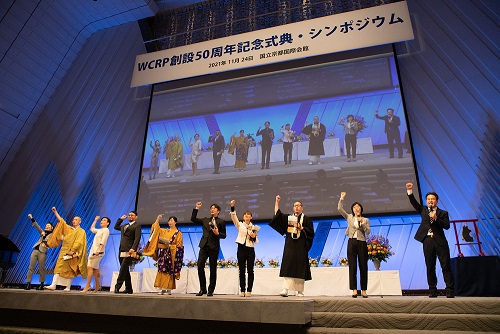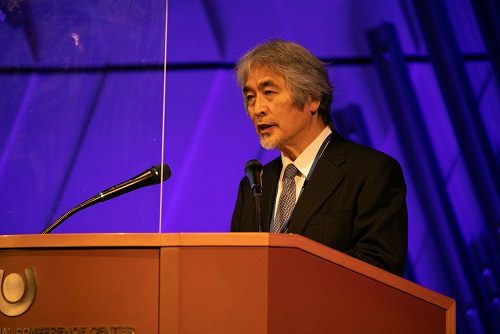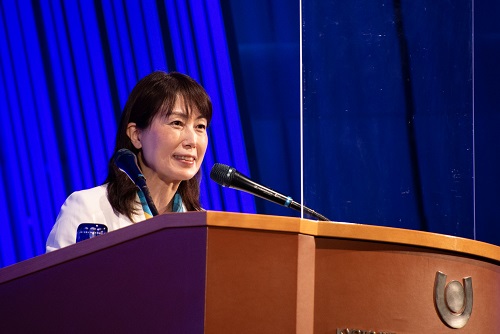
WCRP/RfP Japan held a ceremony and symposium to commemorate the 50th anniversary
of its inception in Kyoto, Japan, on November 24.
Based on its achievements over the past fifty years and looking forward
to the next decade, WCRP/RfP Japan revealed its “Agenda 2030,” with the
following six pillars at the ceremony.
1. Achieve the survival goals shared by the international community.
2. Strengthen efforts for nuclear disarmament, religious freedom, and against
human trafficking.
3. Contribute to establishing a society where no one is left behind.
4. Work on transforming a divisive society into a society of unity and
reconciliation.
5. Work on restoring humanity in a high-tech society.
6. Work on eliminating gender disparities.
Rev. Yoshinori Shinohara, the Director-General of WCRP/RfP Japan, presented
the Agenda with six younger generation representatives of the Japanese
religious community.
There are two reasons why WCRP/RfP Japan formulated the Agenda. First,
being a United Nations’ NGO, WCRP/RfP Japan recognized the importance of
actively achieving the SDGs created by the world body in 2015.
Second, at its 10th World Congress in 2019, RfP International set a strategic
goal in which the interfaith organization called for the strengthening
of global religious cooperation to achieve the SDGs. WCRP/RfP Japan took
note of the importance of that initiative.
Rev. Shinohara also asked the audience to share the eight points mindsets
that WCRP/RfP Japan also drafted.
1. Unify your prayer and action.
2. Act in a way others feel your warmth.
3. Tackle challenges by yourself.
4. Treat all the global population as your immediate neighbors.
5. Recognize the significant value of every human being.
6. Learn by helping others.
7. Be open-minded in connecting to others.
8. Listen to the voices of the next generations.
He said these mindsets are essential to raising awareness in religious
communities. He said such understanding is critical to achieving the agenda
goals.
WCRP/RfP Japan chose Kyoto International Conference Hall as the venue for
the event, as it did in 1970 when it organized the first World Conference
of Religions for Peace.
The president of WCRP/RfP Japan, the Most Rev. Nichiko Niwano (President
of the Rissho Kosei-kai), gave an opening address. Dr. Azza Karam, Secretary-General
of RfP International, and several other dignitaries delivered video messages
online.

Two speakers gave keynote speeches at the symposium. Dr. Juichi Yamagiwa,
former President of Kyoto University, explained that human beings have
the capability of empathy, which is found only in human beings. Based on
his research in anthropology and primatology, he lectured that it is necessary
to create a society that takes advantage of this power of empathy.

The second keynote speaker, Ms. Naoko Yamazaki, became the second female
Japanese astronaut to stay on the International Space Station (ISS) in
2010. She spoke about the first Muslim astronaut on the ISS with her. She
witnessed him praying to Mecca, but only once a day instead of five times
a day. She also recognized some astronauts brought Bibles with them.
She also revealed that a priest from the Russian Orthodox Church conducted
a religious ritual before Soyuz manned spacecraft would be launched in
Russia. “Technology and prayer go together,” Ms. Yamazaki said. Looking
back half a century since humankind embarked on space expeditions, Ms.
Yamazaki said, “I think it is important for us to share a sense of crisis
and cooperate now that the division and conflicts are everywhere.”
After the lecture, a panel of four religious representatives expressed
their impressions. “Many lives are threatened, including those with health
problems or disabilities, the elderlies and neglected, refugees and foreign
workers. I reaffirmed the importance of the WCRP’s activities, in which
we, the religious leaders, are engaged in dialogue and collaborative works,
at such a difficult time like this,” a Catholic representative said.
In the closing remarks, the Most Rev. Makoto Uematsu, Chairman of WCRP/RfP
Japan (Bishop of the Anglican Church in Japan), said, “The elements that
threaten world peace are becoming more and more complicated and serious.
We are facing new challenges. Today’s symposium has reaffirmed the principles
that are important for us, the religious leaders in our efforts to build
world peace.” “To make the Agenda come true, we, the religious leaders,
must cooperate more. More advocacy among us is needed. And above all, we
need to unite our prayers,” President Uematsu added, calling on the participants
to cooperate and pray for future activities.